- Forum
- categories
- Sanitation systems
- Toilets without urine diversion
- Squatting versus sitting in Latin America - and Wikipedia article on squat toilets
Squatting versus sitting in Latin America - and Wikipedia article on squat toilets
39.4k views
- Elisabeth
-
Topic Author
- User is blocked
- Freelance consultant since 2012
Less- Posts: 3372
- Karma: 54
- Likes received: 932
Re: Please help me with a global survey: how common are squatting toilets in your country?
Ah, this is more complex than I thought... Seems like things are quite rapidly changing in Peru and people are beginning to prefer the sitting toilets... Even converting squatting UDDTs to sitting flush toilets - perhaps not because they don't like dry toilets but because they didn't like the squatting part?
I think I should also differentiate between toilets in public buildings (might be more likely to be squatting in some countries) versus toilets in private homes (might be more likely to be sitting in some countries).
Mughal: you said:
but I do think it's necessary. If we as experts are not even sure what someone means when they say that "religious preferences is a factor", then how can we expect the general public who reads on Wikipedia to understand what we mean?I don't think it is necessary to go in great details
By the way, nobody likes splashing of water from a water closet when the feces drop into the water - whether a Muslim or not. I would say such splashing is not so common in sitting toilets either as the distance between the body and the water level is reasonably large. But I have experienced it on occasions - and this is an advantage of a dry toilet where you definetely don't get splashing.
Emmanuel, you said:
I suspect that this is actually an "urban myth" that women can get fungal infections from sitting on the seats of public toilets - or has anyone ever seen any scientific studies on that?But not good for the community especially with different background. one can easily acquire fungal infections and other related infections more especially women with a big opening valve!
It is very wide-spread impression also here in Germany. We got onto this topic when we investigated why some females were not sitting down on the seats of the Roediger NoMix toilets in our office building in Eschborn (part of the Saniresch project, see also here on the forum: forum.susana.org/forum/categories/173-ur...-in-eschborn-germany .
You had to sit on this kind of urine diversion flush toilet in order to open the urine valve. But some of the female users didn't like sitting, they were "hovering" over the seat or covering the seat with lots of toilet paper ("building a nest"). I have been told by some women that they always get fungus infections otherwise. I found that hard to believe, but after speaking to many women, I formed the conclusion that about one third of women in Germany do not sit down on public toilet seats - or if the seat looks dirty then the proportion of people not sitting goes up of course.
I checked the final report of the SANIRESCH project and this issue is mentioned here:
www.susana.org/en/resources/library/details/1705
I first put the text in German from the report and then in English:
Leider hat hier auch das Projekt SANIRESCH gezeigt, dass nur wenige Frauen bereit sind, sich im Bürogebäude aus hygienischen Gründen auf den Toilettensitz zu setzen. (page 30)
[...]
Ein Grund hierfür ist etwa die Tatsache, dass 11,1% der Teilnehmer es ablehnen, sich auf
öffentlichen Toiletten hinzusetzen. (page 148)
In English:
The Saniresch project showed that only few women are willing to sit down on the toilet seat in office buildings, due to hygiene considerations.
One reason is that fact that 11.1% of survey participants rejected sitting down on the seats of public toilets.
(The second sentence actually contradicts a bit the first one, as only 11% said they don't sit down so it's not really "few" women who do sit down; in fact 89% of women in this survey do sit down it seems.)
Regards,
Elisabeth
++++++++
This thread is continuing here (global survey):
forum.susana.org/forum/categories/141-ot...lets-in-your-country
Freelance consultant on environmental and climate projects
Please Log in to join the conversation.
You need to login to replyRe: Squatting versus sitting as a defecation posture - The Squatty Potty - "healthy colon - healthy life"
Thanks for these photos. Now that I see these, I have seen this (crude) Cusco model once in Ecuador, at a Catholic mission school for Shuar students, run by Italian Salesian priests (Bomboisa, Morona Santiago Province). So I have seen that one ''organized'' squat toilet in Ecuador (aside from the UDDTs we build).
Best wishes,
Chris Canaday
Omaere Ethnobotanical Park
Puyo, Pastaza, Ecuador, South America
inodoroseco.blogspot.com
Please Log in to join the conversation.
You need to login to replyRe: Squatting versus sitting as a defecation posture - The Squatty Potty - "healthy colon - healthy life"
a) a store in Cusco selling pans.
b) some pictures of a squatting UDDT in Bolivia. which has been changed in favor of a water closet!
Regards
Christoph
Attachments:
-
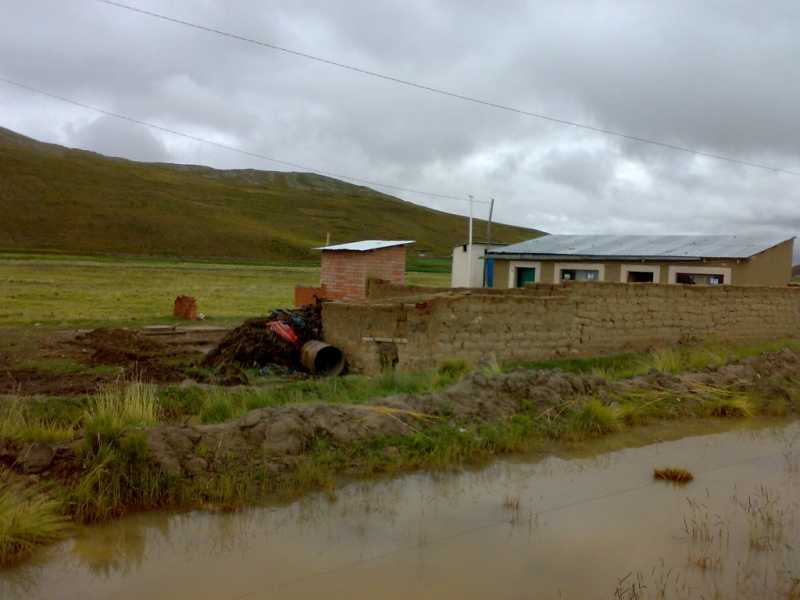 10022009473.jpg
(Filesize: 33KB)
10022009473.jpg
(Filesize: 33KB)
-
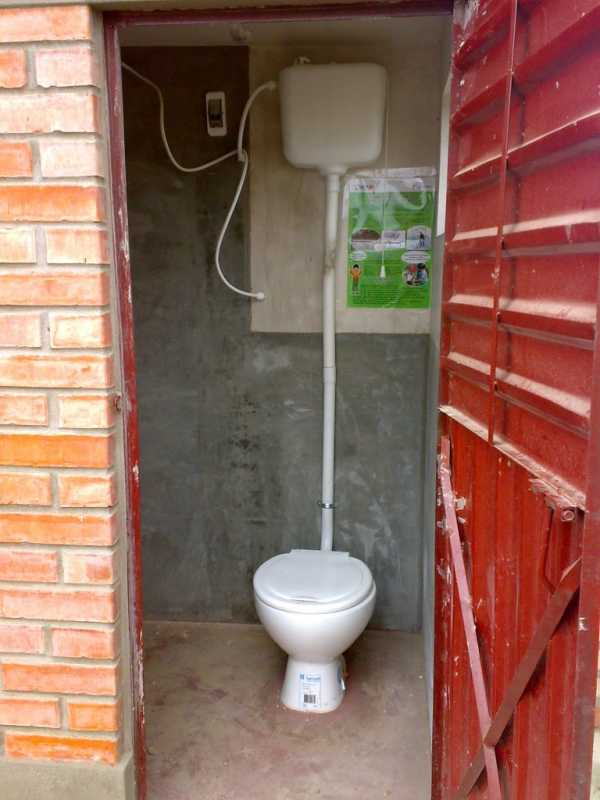 10022009472.jpg
(Filesize: 41KB)
10022009472.jpg
(Filesize: 41KB)
-
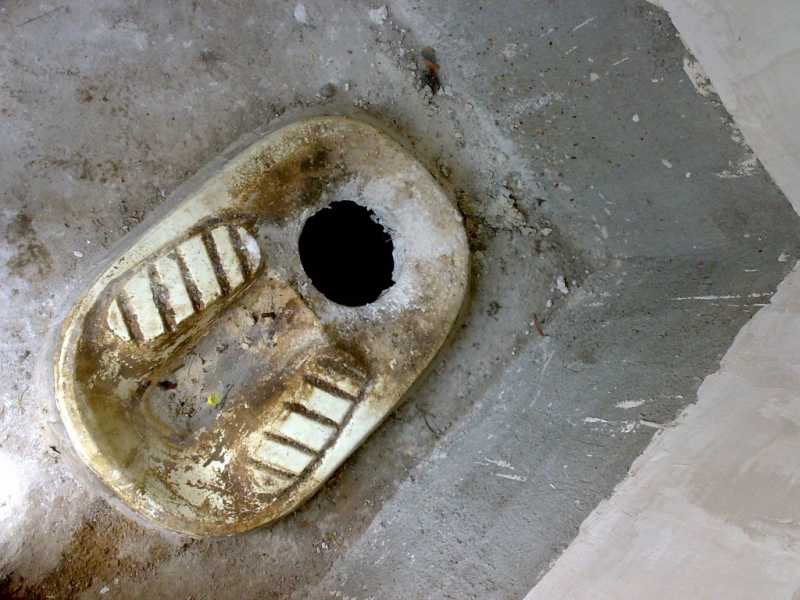 10022009470-1.jpg
(Filesize: 51KB)
10022009470-1.jpg
(Filesize: 51KB)
-
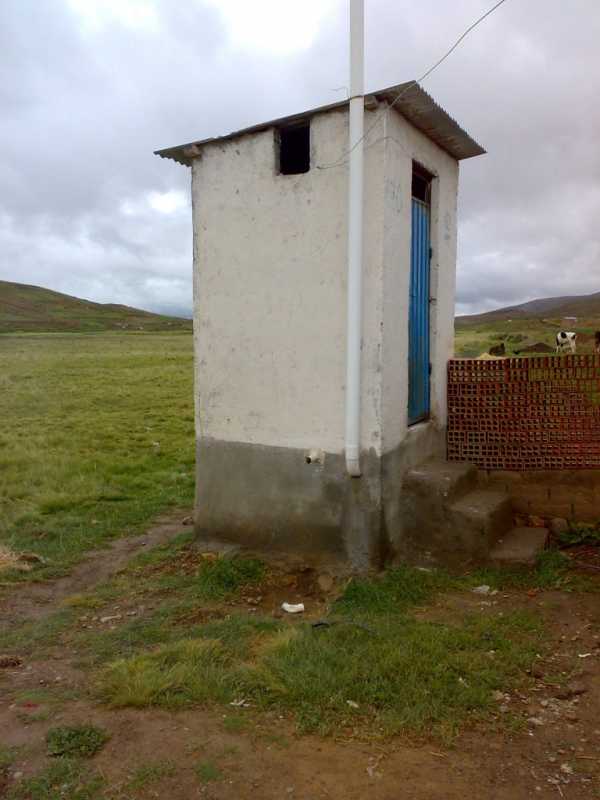 10022009467.jpg
(Filesize: 38KB)
10022009467.jpg
(Filesize: 38KB)
-
squatting2.JPG (Filesize: 68KB)
Please Log in to join the conversation.
You need to login to replyRe: Squatting versus sitting as a defecation posture - The Squatty Potty - "healthy colon - healthy life"
What do you mean by ''low flush''? Does that mean pour flush? Do you have any photos of those toilets for squatting?
Best wishes,
Chris Canaday
Omaere Ethnobotanical Park
Puyo, Pastaza, Ecuador, South America
inodoroseco.blogspot.com
Please Log in to join the conversation.
You need to login to replyRe: Squatting versus sitting as a defecation posture - The Squatty Potty - "healthy colon - healthy life"
in Peru and Bolivia squatting toilets exist as dry and as well as pour flush, they are common. I can't give percentages, I would estimate in the "Sierra"* they are (were) more common than sitting toilets, in the Amazonas and Costal region (Peru) there are more sitting toilets. But we build - asked by the people to do so - only sitting toilets in the sierra.
We offered always the choice and we had a fiberglass squatting pan as well
(but did not sell any). So habit seems to be changing.
Regards
Christoph
+++++++
* added by moderator: Sierra is the Andean Mountain Ranges in Peru (en.wikipedia.org/wiki/Geography_of_Peru#Andean_Mountain_Ranges)
Attachments:
-
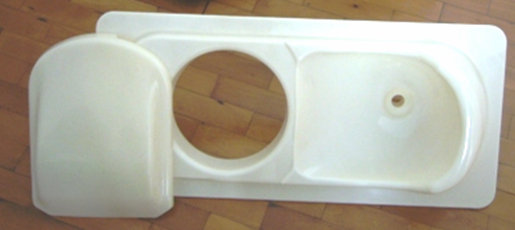 squatting.jpg
(Filesize: 19KB)
squatting.jpg
(Filesize: 19KB)
Please Log in to join the conversation.
You need to login to replyRe: squat for money - The Squatty Potty - "healthy colon - healthy life" (product from the US)
It would be interesting to learn more about the non-sewered Baghdad toilets you are talking about. Do you have any diagrams or images to share? They sound like field or emergency toilets.
I was talking about permanent porcelain household toilets connected to the sewer, which use drinking water for both flushing and anal washing (using an upward-stream through a pipe within the bowl. I'm sorry if I wasn't very clear.
Public Hygiene Lets Us Stay Human (PHLUSH)
1240 W. Sims Way #59, Port Townsend, Washington 98368 USA
Toilet availability is a human right and well-designed sanitation systems restore health to our cities, our waters and our soils.
Please Log in to join the conversation.
You need to login to replyRe: squat for money - The Squatty Potty - "healthy colon - healthy life" (product from the US)
Executive Director Team Work Afrika (TWA)
Nsambya, Makindye Road, Ave-Maria Stage P.O Box 28982 Kampala - Uganda- East - Africa
Tel: +256 (0) 712-994-236/0778-203-944
Email: This email address is being protected from spambots. You need JavaScript enabled to view it.
Personal This email address is being protected from spambots. You need JavaScript enabled to view it.
Please Log in to join the conversation.
You need to login to replyRe: squat for money - The Squatty Potty - "healthy colon - healthy life" (product from the US)
In our Baghdad house we had porcelain thrones with small upwardly-bent pipes right inside the bowl through which we deployed warm water from a faucet handle on the wall. I don't have a photo and wonder if anyone can provide details on the plumbing. The only disadvantage of this system is that it does not easily accommodate wipers, as the toilet paper gets hung up on small pipe and requires manual removal.
In Tunisia, a metre-long flexible hose is hung on the wall attached to the warm and cold mix faucet and deployed by the user. Our houses in Pakistan generally offered both squatting and sitting toilets, served in both cases by a "lota' or pitcher, which users can fill, to the desired temperature where hot water is available.
In the old city of Sana'a, Yemen, I've used the traditional top story desiccating toilets where excreta falls outside the building through the bone dry air into a small pit on the ground. Squatting, of course, with a container of wash water carried up from below. Our own single storey mud brick house, however, had the contemporary plumbed flush pedestal toilets which have put quite a burden on the city's depleted aquifer.
Public Hygiene Lets Us Stay Human (PHLUSH)
1240 W. Sims Way #59, Port Townsend, Washington 98368 USA
Toilet availability is a human right and well-designed sanitation systems restore health to our cities, our waters and our soils.
Please Log in to join the conversation.
You need to login to replyExecutive Director Team Work Afrika (TWA)
Nsambya, Makindye Road, Ave-Maria Stage P.O Box 28982 Kampala - Uganda- East - Africa
Tel: +256 (0) 712-994-236/0778-203-944
Email: This email address is being protected from spambots. You need JavaScript enabled to view it.
Personal This email address is being protected from spambots. You need JavaScript enabled to view it.
Please Log in to join the conversation.
You need to login to replyRe: squat for money - The Squatty Potty - "healthy colon - healthy life" (product from the US)
In Makkah and Madinah, where I have been to 5 times, all the toilets in Masjid-e-Haram (the Grand Mosque) in Makkah; and in Masjid-e-Nabvi in Madinah have squat toilets (as shown in your first figure) - and these toilets run in thousands!. One may ask, why it is so. The answer is that of religious considerations. In sitting toilets, there are chances of splashing - and this is not allowed in Islam.
Having said that, there are many toilets in Pakistan of sitting type. There are two-fold reasons: one, obese people, or people with medical problems in knees, or having back pain, cannot use the squatting posture. They are comfortable with sitting postures. Doctors also advise that. One way to avoid splashing is to put few tissue papers in the WC - this preventing splashing. The other option is to clean that splashed part with water.
Those who do not practice Islam in strict sense, do not care about the types of postures. And, as you say, here also, in high-class hotels, they all have sitting toilets, to cater for the needs of western visitors.
So, just mention the one sentence I stated in my earlier post (if you feel like). That sentence, by and large, covers the point, I'm trying to say.
Cheers,
F H Mughal
Karachi, Pakistan
Please Log in to join the conversation.
You need to login to reply- Elisabeth
-
Topic Author
- User is blocked
- Freelance consultant since 2012
Less- Posts: 3372
- Karma: 54
- Likes received: 932
Re: squat for money - The Squatty Potty - "healthy colon - healthy life" (product from the US)
I know e.g. in Morocco, which is also a Muslim country, all the toilets I have ever been to in the major cities (Rabat, Casablanca) were of the sitting type, even though people do practise anal cleansing with water there. In the rural areas of Morocco, I believe that squatting is more common but I have no data on that.
I have the suspicion that the sitting versus squatting issue is more related to regions of the world and perhaps some climate aspects rather than religious aspects? If I remember right, Lucas Dengel (or was it Paul Culvert?) from India once told me that in India people of all faiths practise anal cleansing with water (also Christians), and they do use mostly squatting toilets there (mind you, in hotels and restaurants in Delhi I found only sitting toilets but perhaps that's catering for Westerners, I am not sure).
There is by the way this article on Islamic toilet etiquette on Wikipedia:
en.wikipedia.org/wiki/Islamic_toilet_etiquette
Would you (or anyone else who is well versed in Islam) say the article is correct? It doesn't mention anything about squatting versus sitting.
Freelance consultant on environmental and climate projects
Please Log in to join the conversation.
You need to login to replyRe: squat for money - The Squatty Potty - "healthy colon - healthy life" (product from the US)
Perhaps, you may like to add this:
Religious considerations also impacts the preference for, and choice of, squat toilets.
after
In Latin and South America, squat toilets that use water for flushing (flush toilets) are always of the sitting type, whereas toilets that do not use water for flushing (pit latrines and urine-diverting dry toilets) may be of either type, i.e. to be used in a sitting or a squatting position.
Cheers,
F H Mughal
Karachi, Pakistan
Please Log in to join the conversation.
You need to login to reply- Forum
- categories
- Sanitation systems
- Toilets without urine diversion
- Squatting versus sitting in Latin America - and Wikipedia article on squat toilets








